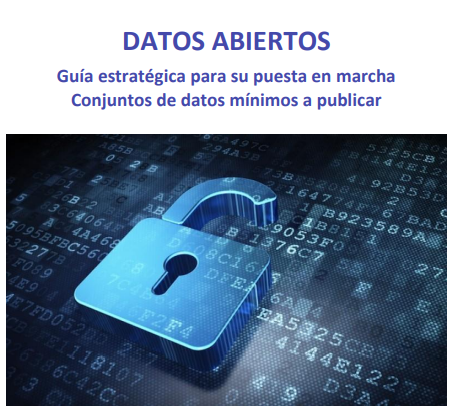
Although local governments are the closest actors to citizens, they often face limitations in terms of resources and capacities to implement open data effectively. The diputations, as intermediate institutions between central government and municipalities, play a key role in coordinating, supporting and facilitating open data at the local level.
In this article, we will explore the work of the Diputaciones in this area, showing some examples.
Why is it important for local authorities to commit to open data?
Local open data is of great importance to citizens because of its high granularity. These data provide information on specific settings, which gives a detailed picture of the situation of citizens in that area and shows disparities between municipalities.
This offers multiple advantages. On the one hand, public administrationscan develop better policies and manage resources more efficiently. On the other hand, businesses, researchers and entrepreneurshave the opportunity to develop new, more customised solutions based on the needs of each location. It also improves transparency and accountability, fostering trust in local institutions, and facilitates citizen participationby giving residents access to key data about their municipalities, which can contribute to more active and informed decision-making.
Challenges for local authorities in opening up their data
Despite the advantages, local authorities face a number of challenges in trying to make their data available to citizens, many of which are related to resource constraints and technical capacity:
- Lack of technical and human resources: Many municipalities, especially small and medium-sized ones, do not have the trained staff and resources to manage and publish open data. Lack of IT and data management expertise can hinder the implementation of open data initiatives.
- Inadequate infrastructure: Open data requires adequate technological infrastructure, such as platforms and storage systems to host data in an accessible and secure way.
- Awareness and resistance to change: In some municipalities, both policy makers and public employees may not fully understand the benefits of open data, leading to resistance to change.
- Data quality and standardisation issues: Municipal data are often scattered across different systems and formats, which can make standardisation and validation difficult. Ensuring that data is correct, up to date and in reusable formats is a major technical challenge.
- Cost of implementing, maintaining and updating data: Opening up data involves not only having the right infrastructure and staff, but also investing in platforms, software and other tools needed to make the information accessible to the public, which can be a barrier for municipalities with tight budgets. Moreover, once data is available to the public, it is necessary to keep it up to date and ensure that it remains relevant, which is a constant effort.
How can county councils help local authorities to overcome these challenges?
The Diputaciones are supra-municipal entities whose functions include legal, economic and technical assistance and cooperation to the municipalities in their province, especially those of smaller size or fewer resources. Among other things, they offer support in technological and managerial matters, for example in administrative tasks, the provision of public services or economic development.
In the context of open data, local councils can act as "facilitators" of open data at local level, through different actions:
-
Technical advice and training
The Diputaciones offer training to municipalities so that municipal employees can learn how to manage and open data. This is something that the Diputación de Salamanca, for example, has done with this course, whose objectives included raising participants' awareness of the importance of open data as a means to enhance citizen participation, helping them to understand technical issues in order to boost the degree of openness of institutions.
The Diputación de Castellón, for its part, provides support to small municipalities in opening their data, offering support materials related to open data. Another example is the Provincial Council of Albacete, which provides technical assistance, monitoring and support to its 87 municipalities through the Provincial Sustainability Observatory of Albacete (OPSA), an entity in collaboration with the University of Castilla-La Mancha. To this end, it offers sustainability reports (with 25 indicators), monitors its localization plans and emission studies, offers training and guides related to the sustainability of its municipalities related to open data, etc.
-
Technological infrastructure
Some councils provide digital platforms and tools for municipalities to upload and share data in a simple way. This includes hosting open data portals or analysis and visualisation tools.
This is the case of the Diputación de Bizkaia, whose scope affects the foral public sector (Foral Entities) and the Local Entities of Bizkaia. Through the BiscayTIK foundation, municipalities can join the Open Data Bizkaia portal so that their data can appear on this portal. In addition, a customised view is generated that can be embedded in the municipality's own website, in case they want to have their own open data portal.
Another example is the Diputación de Córdoba. Its provincial strategy consists of unifying efforts and making a common platform for all municipalities, through automated processes of extraction and processing of structured information for publication, without the need for manual dedication on the part of staff. Through the Enlaza project, the platform receives and monitors information obtained both from citizens and from the sensors and systems of the multiple municipal services, and then carries out a cross analysis of the data. With this service, all the town councils in the province of Cordoba can have a homogeneous catalogue of open data with automated loading, which in turn is federated with datos.gob.es, saving this procedure for smaller administrations.
The Diputación de Albacete, for its part, has a platform with an open data exhibition of the panel of local indicators of the province (48 sub-indicators with a historical series of +15 years). The standardization of open data facilitates municipal and provincial analysis, allowing the comparison of municipalities with graphical and georeferenced output. Includes download space with user registration.
Thanks to these actions double efforts and duplication of uploading of information on various platforms are avoided. In addition, the standardisation of open data facilitates regional analysis and comparison between municipalities, generating new opportunities for innovation and improvement in the quality of life of citizens.
-
Grants or funding
Sometimes, the local councils allocate financial resources so that small municipalities can implement open data projects. An example of this is the Diputación de Valencia, whose functions include fostering and developing the right of access to information, as well as promoting the re-use of public data. To this end, in 2024, it launched a series of aids.
In this line the Diputación de Albacete has an annual aid or call for municipalities to implement their Agendas 2030 or projects related to sustainability and included in their plans. For example, in February 2025 the call was published with a budget of € 325,000.
-
Awareness-raising and reuse promotion actions
Another area where county councils can help is the promotion of favourable frameworks for data re-use. The Diputación de Castellón, for example, maintains a close relationship with civil society organisations and universities to meet their data demands. With the collaboration of the Diputación de Barcelona and the Government of Aragón, organised in 2024 the III National Open Data Meeting, where the importance of open data as a resource for understanding and achieving interesting and sustainable tourism was disseminated.
For its part, the Diputación de Bizkaia is launching competitions such as the Open Data & Artificial Intelligence Challenge, aimed at identifying initiatives that combine the reuse of data available on the Open Data Bizkaia portal with the use of this disruptive technology in various sectors.
In conclusion, the collaboration between councils and municipalities makes it possible to generate greater cohesion in the opening of data throughout the territory, ensuring that all municipalities, regardless of their size or resources, have access to the necessary tools and knowledge. However, local councils also have their technical and resource limitations, so this is an area where further progress needs to be made, with a focus on raising awareness of the benefits of open data and collaboration between institutions.


Me gustaría aportar información para su publicación y comunicación, espero que vengan a bien incluir:
1. Asesoramiento técnico y formación
La Diputación de Albacete, proporciona asistencia técnica, seguimiento y apoyo a sus 87 municipios a través del Observatorio Provincial de Sostenibilidad de Albacete (OPSA) entidad en colaboración con la Universidad de Castilla-La Mancha. Ofreciendo informes de sostenibilidad (25 indicadores), seguimiento de sus planes de localización, estudio de emisiones… formación y guías vinculadas a la sostenibilidad de sus municipios relacionados con los datos abiertos.
2. Infraestructura tecnológica
La Diputación de Albacete dispone de una plataforma o web (https://observatoriosostenibilidad.dipualba.es/), con una exposición de datos abierto del panel de indicadores locales de la provincia (48 subindicadores con una serie histórica de +15 años) la estandarización de los datos abiertos facilita el análisis municipal y provincial pudiendo compararse entre municipios con salida gráfica y georreferenciada, con espacio de descarga con registro de usuarios. ítems logrados en sostenibilidad y sobre el cumplimiento de 17 ODS, síntesis de un ILV y exposición del registro de carbono municipal (emisiones, huella, sumidero…). Además de información referente a la implantación de la A2030 a nivel provincial (diagnostico, participación, indicadores, estrategia…), noticias de interés e información relevante, de forma abierta.
3. Subvenciones o financiación
En esta línea es la Diputación de Albacete, dispone de una ayuda o convocatoria anual para que los municipios puedan implementar sus A2030 o proyectos vinculados a la sostenibilidad y recogidos en sus planes. Por ejemplo en febrero de 2025 se publicó la convocatoria con 325.000 € de presupuesto.
Espero que sea de su interés
Muchas gracias por la información, se ha incluido en el artículo.